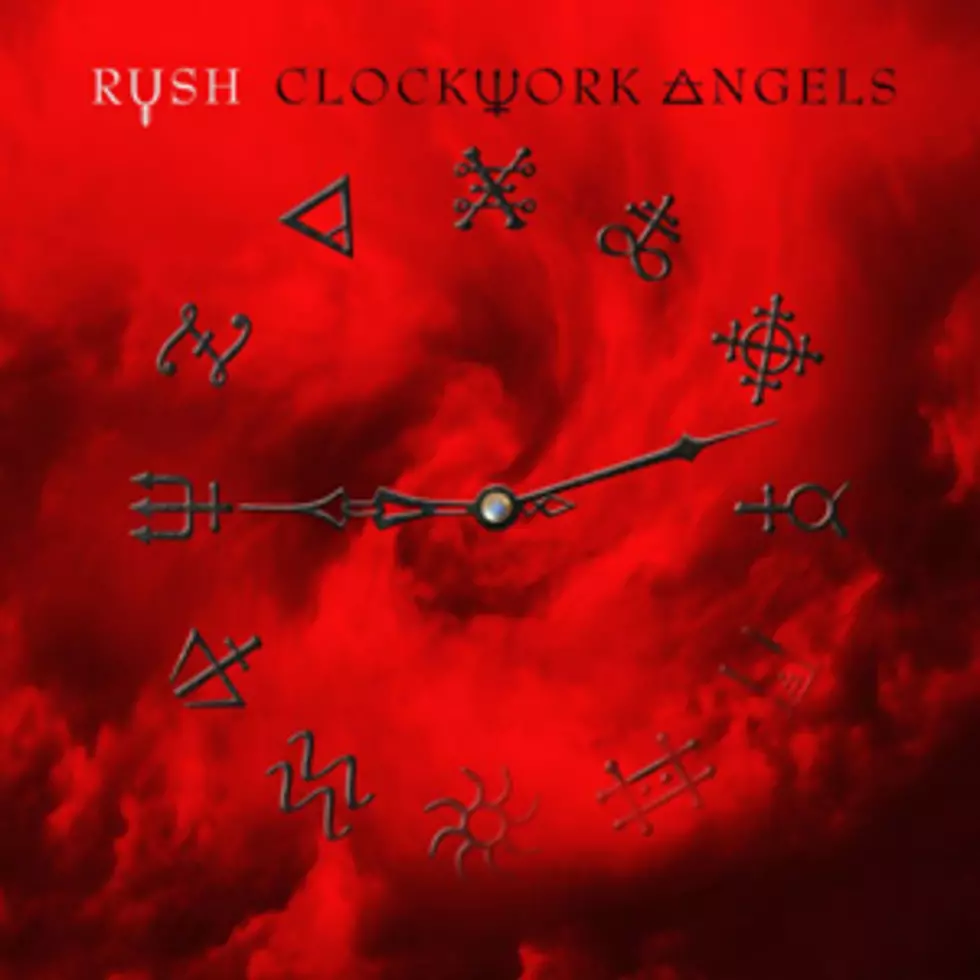
Rush, ‘Clockwork Angels’ – Album Review
There are so many reasons why ‘Clockwork Angels,’ Rush‘s 19th studio album, should suck — we lack the appropriate space to list them all.
But in a nutshell, progressive rock bands who survive four decades of the record-tour grind, not to mention the needless critical hatred directed towards the genre, typically don’t flourish creatively as their players approach 60.
But Rush have never been your typical prog-rock band. As the genre was falling out of critical favor in the late ’70s, the Canadian power-trio were just getting warmed up, releasing prog pinnacles like ‘A Farewell to Kings’ and ‘Hemispheres’ before the decade finally rolled over and croaked.
They’re arguably also the only progressive rock band to actually roll with the sonic punches in the ’80s (embracing synthesizers, gated drum sounds and new-wave) and ’90s (harder-edged modern-rock production) without losing the spirited virtuosity that made them so unique in the first place.
There have been speed-bumps along the way, no doubt about it (Anybody remember the Chinese synth runs on ‘Tai Shan’?) — but if Rush have proved anything in their lengthy and winding career, it’s that they’re survivors.
To say ‘Clockwork Angels’ has been long-awaited would be an understatement: It’s been five years since ‘Snakes & Arrows,’ Rush’s tightest, most powerful and dynamic album since the ’80s, and in the years since, they’ve teased fans with bits and pieces of a supposed epic masterwork. Tracks like ‘Caravan’ and ‘Headlong Flight’ sounded familiar but resilient on their own; packaged together on ‘Clockwork Angels,’ they feed off each other, towering like anthems. Once again utilizing the production skills of Nick Raskulinecz, the trio have not only built on the return-to-form that was ‘Snakes & Arrows’ — they’ve surpassed it.
Though bassist/vocalist Geddy Lee, drummer-lyricist Neil Peart, and guitarist Alex Lifeson are clearly all fantastic players, Rush have always been at their worst when they put pummel above craft. Hearing Lee and Lifeson engage in arena-metal warfare can be enthralling, but it’s almost never surprising.
Raskulinecz knows this, which is why he reportedly whipped them into shape in the studio with his sonic jedi mind-tricks, conducting Peart’s tom-tom fills with a drum stick-baton, awkwardly pushing Lee and Lifeson to tighten up their parts. As a result, ‘Clockwork Angels’ sounds urgent, almost possessed, mostly eschewing long-winded jams and atmosphere in favor of a lean, muscular sound equally melodic and thunderous.
Highlights overflow: On the note-perfect title track, Lifeson morphs from clean, chiming riffs to distorted thrust, with Peart pounding away nimbly under Lee’s soaring, gorgeous harmonies. ‘Halo Effect’ is arguably the band’s finest epic ballad since ‘Closer to the Heart,’ with great acoustic work from Lifeson and haunting orchestral interjections. “The Wreckers” is chest-pounding, life-affirming rock majesty, with layers of lovely Lifeson overdubs and one of Lee’s catchiest and most heartfelt choruses.
“All I know is sometimes you have to be wary / Of a miracle too good to be true,” he sings, moments before angelic strings sweep in from the heavens. The group’s instrumental powers have arguably never been sharper: Lee, bounced up to the front of the mix, is absolutely on fire, his thick bass tones punching up tracks like ‘Caravan’ and the downright funky ‘Seven Cities of Gold.’
‘Clockwork Angels’ is reportedly a concept album involving a repressive force known as ‘The Watchmaker.’ Do your homework, and I’m sure a narrative will emerge, but more important here is the focus Peart’s poignant lyrics give the songs. Even taken strictly at face value, his words are poetic mazes of rhyme, alliteration, and metaphor, filled with references to “angels,” “prayers,” and “miracles.” Concept aside, these words sound important to Peart himself, and Lee delivers them with subtlety and grace — it’s one of their finest marriages of lyric and melody.
‘Clockwork Angels’ is the thrilling sound of ‘classic Rush,’ but it’s never a nostalgic, archaic rearview glance. It’s the sound of ‘classic Rush’ in 2012 — and more importantly, it feels relevant outside of their own discography. It just might be the year’s finest rock album so far.
Suck on that, Rock and Roll Hall of Fame.
More From 103.7 The Loon
![BAXTER’S ATTIC Uriah Heep “Stealin'” [VIDEO]](http://townsquare.media/site/66/files/2012/06/hqdefault14.jpg?w=980&q=75)





![Sartell Mayor Joe Perske Gives Insight on Verso Paper Mill [AUDIO]](http://townsquare.media/site/66/files/2012/05/Verso-Paper-Mill1.jpg?w=980&q=75)



